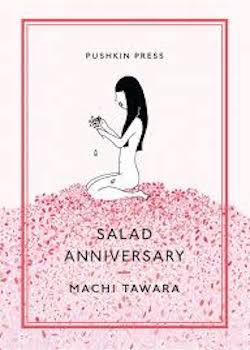Salad Anniversary

By Tawara Machi
Translated by Juliet Winters Carpenter
Pushkin Press, 2014
ISBN-10: 1782271066
Review by Chris Beckett
I love the spareness of haiku and tanka, that feeling of a pebble sending ripples through your head. So I find it rather daunting to open a collection with over 300 such poems! To me, it feels contradictory to crowd haiku, which depend on the empty space around them on the page and in the reader’s brain to breathe and work their magic.
But I need not have worried: Salad Anniversary, is a delightfully small-sized book, with a washed pink cover, light but solid. And Tawara Machi’s poems are short but lively and personal. I do not think they need a lot of space around them. They feel more like an album of small photos telling a story, so engaging and contemporary that it becomes part of the reader’s own album, his or her own story.
The first sequence ‘August Morning’ charts the arc of a relationship, centred on Kujukuri Beach, from
Is there anything more?
More to believe, more to want?
Sprawled side by side on sand
through tender details of the everyday
Your hand
signalling for a draft beer
catches my eye and absorbs me
to the break-up
Late afternoon –
you and I gaze at the same thing
as between us something ends
Tawara delights in small almost trivial details, and frequently inserts snippets of speech
“Today the public bath was closed.”
I want to spend every day
talking of little things like that
and the details are always telling: her poems do not need a lot of space precisely because they are rooted in the urban rather than the eternal. Or perhaps I’d say they are about the eternal as expressed through the ephemeral urban clutter; even the clutter of ephemeral human relationships. She substitutes falling leaves or blossoms with an old toothbrush, a train ticket or, indeed, a salad (which must be wilting, at least by its anniversary). Her poems are set in the contemporary whirl and for all of us city whirlers they are easy to understand and to be moved by. Like sugar they go straight into the blood. They occasionally become a little cute for my liking (kawai, neh!), but there is a constant sense of the woman’s viewpoint which is clear-eyed and refreshing:
“Call me again” “Wait for me”
Your love is always spoken
in commands
So I can easily appreciate the book’s huge bestseller status in Japan, the so-called “Salad phenomenon” (over 2.5 million copies sold!). What I find harder to grasp is why Juliet Carpenter has chosen 3-line stanzas when translating 5-line tanka. In the ‘Afterword’ she points out that the original Japanese poems are normally written in a single vertical line, sometimes interrupted, but not necessarily in accordance with the traditional 5-7-5-7-7 syllable count. Even so, it is strange to see 3-line poems which look like haiku but don’t sound like haiku and then to find out that they are tanka! I would have tried to keep the 5 line structure but varied the line lengths with the sense: after all, Tawara apparently keeps to the syllable total of tanka.
But in the end, this is just a cavil: I think lots of English language readers will love these poems, like the millions of Japanese , regardless of whether they like poetry or care a fig about poetic forms.

